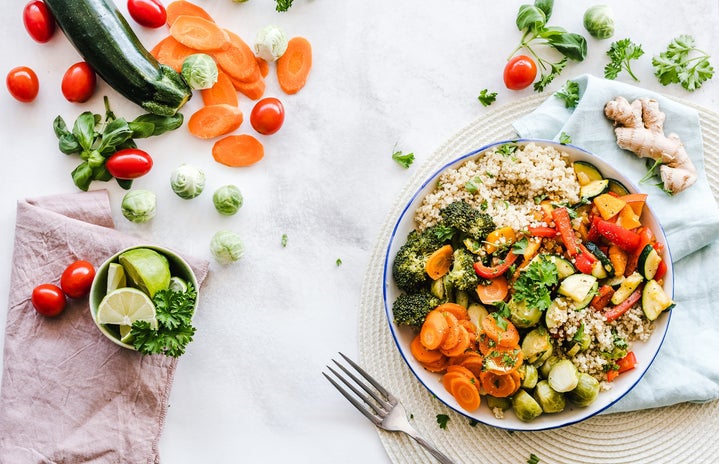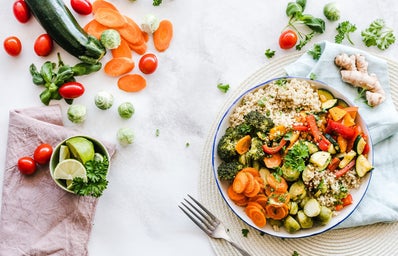How to cook and eat better in college without hurting your bank account
My freshman year, I spent around $700 on Starbucks coffees. That is not a number I am proud of, but it is a lesson I learned that helped me become more aware of my food spending habits in college.
You have to cut me some slack. It was my freshman year; I had never been completely by myself and I have horrible money management skills. But I also admit it was at least 90% my fault for a lack of planning.
College becomes hectic easil, with assignments, club meetings, outings with friends, internships, volunteering, exams and so little time to do everything on your own. So, when it comes to food, planning is the key. I know it is easier to get Uber Eats every night and buy chips from vending machines to eat between class breaks, but your body will thank you if you take a break from that and put a little effort into eating nutrient-dense meals.
Unlike freshman year, this year I decided to not get a meal plan, to cut down on the Starbucks and to make the food myself. It has been a learning process, and I still break my rules occasionally, but it has helped my eating habits and my bank account. So, here are a couple tips on meal prepping and eating well on a college budget.
Start with what you know
Planning out your meals for the entire week, every week, can feel daunting, so start small with what you know in the kitchen. For me, it was pasta. Pasta is any amateur cook’s best friend because it is easy, quick and requires very few ingredients. It is also amazing for meal prepping because of its flexibility and durability. According to Healthline, pasta lasts around 3-5 days in the fridge, so what I did on my first week of meal prepping was make a big batch of plain pasta, and then I ate it with different sauces throughout the week.
Whether it is pasta, rice or even just bread (you would be surprised with how many things you can do with bread), start with a base you know well and build your meals from there. Try to choose things that can last in the fridge long enough to repeat throughout the week.
Process your protein
I cannot stress this enough: buy protein and separate it into portions, it will save your life. My strategy is best explained with chicken. I buy a pack of boneless, skinless chicken breasts and separate it into portions, season each one and label whether it is a big or small portion on a Ziploc bag. The portions then go in the freezer and because they only take about 10 minutes to thaw under hot water and eight minutes to cook, I can eat delicious chicken breasts in under 20 minutes.
For storage, I use Ziploc bags, but if you want to save the environment, you can also buy freezer-safe Tupperware containers, which won’t be more than $15 and will be an asset for a long time. It is also worth noting that protein is better kept in the freezer when it is uncooked, according to EatingWell. Uncooked chicken can last months in there without going bad or losing its flavor.
Keep your options open
Yes, meal prepping is great and will help you eat better and cheaper, but sometimes, there is just no time to thaw and cook chicken breasts, so always keep your options open. Plan as many meals as you can, but when grocery shopping, keep in mind that sometimes simple, microwave-ready meals are a good option. I try to keep freezer meals to the minimum, but a Publix pizza is currently sitting in my fridge and because I am slammed with homework and midterms, it will probably be my dinner tonight.
If do the math, at the end of the day, it is cheaper to buy freezer meals, which may not be the healthiest, than paying for Chipotle delivery every night that will also not do anything good for your arteries.
For reference, some of my favorite ready meals are Publix pizzas, cooked mashed potatoes, freezer orange chicken and Kraft mac and cheese. These are not healthy, but they have good prices and will cost me less money and time than standing in the Hub Chick-fil-A line in between classes.
Budget, budget, budget
I know this step is annoying because who has time for keeping track of their money? But it is vital if you don’t want to accidentally spend your financial aid refund on trips to Wawa. I have learned that by keeping track of what I spend, I hold myself accountable.
There are apps you can use, like Mint or EveryDollar, or you can go the simple way and use an Excel spreadsheet but keep track of how much you spend in food and set goals for yourself on how much it should be. By keeping a budget, you also help yourself financially in other areas that have nothing to do with food; you can be more careful with how much you spend on clothes, entertainment and even getting into clubs. This way, you know exactly how much money you can set aside to occasionally eat out with friends and still get your groceries for the week.
Nobody’s perfect
Finally, remember that routines are hard to maintain, and nobody is doing a perfect job at meal prepping or saving money. Allow yourself to eat out with your friends, to get Uber Eats when the stress becomes too much and to stop for that $6 Starbucks coffee on the way to class. Breaks in routine are normal. There can be times when it is hard to keep up, but what matters is insistency, not consistency.
Re-start when you have to, forgive yourself for the-slip ups and allow space for rewards when you’ve been keeping a good pace in your eating and spending. Meal prepping should be about making your life easier, not harder, so you can shape it in whatever way works best for you.


